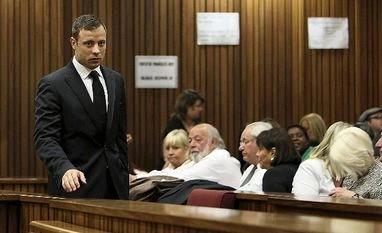Oscar Pistorius was convicted of murder today by South Africa's Supreme Court of Appeal, which threw out his earlier conviction on the lesser crime of culpable homicide for killing his girlfriend.
"Guilty of murder, with the accused having criminal intent," judge Eric Leach told the court. "The matter is referred back to the trial court to consider an appropriate sentence."
The Paralympic sprinter was found guilty last year of the lesser crime of culpable homicide -- the equivalent to manslaughter -- for killing Reeva Steenkamp in the early hours of Valentine's Day, 2013.
At the crux of the appeal case was how trial judge Thokozile Masipa interpreted the principle of "dolus eventualis" -- awareness of the likely outcome of an action -- under which she acquitted Pistorius of murder.
State prosecutor Gerrie Nel argued that Pistorius intended to kill whoever was behind the toilet door through which he fired four bullets.
"Firing through the door at torso level into a small cubicle... The foresight must be that someone would die," Nel told the court in Bloemfontein at a one-day hearing in November.
Pistorius, 29, was released on October 19 to spend the remainder of his sentence under house arrest at his uncle's mansion in Pretoria.
He shot Steenkamp, a model and law graduate, at the peak of his fame, following his historic performance in 2012 when he became the first double-amputee to race at Olympic level.
In the shooting's aftermath, he lost his glittering sports career, lucrative contracts and status as a global role model for the disabled.
His release on house arrest after serving one-sixth of his sentence was in line with normal treatment of South African convicts, but was criticised by women's rights groups and many others in the country.
Last month he made his first appearance in public since being released when he reported for his first day of community service at a police station in the South African capital Pretoria.
According to South African law, the minimum sentence for a murder conviction is 15 years in prison.
"Guilty of murder, with the accused having criminal intent," judge Eric Leach told the court. "The matter is referred back to the trial court to consider an appropriate sentence."
The Paralympic sprinter was found guilty last year of the lesser crime of culpable homicide -- the equivalent to manslaughter -- for killing Reeva Steenkamp in the early hours of Valentine's Day, 2013.
More From This Section
Pistorius, who said he mistook Steenkamp for an intruder when he opened fire with his pistol, was released from prison on parole in October after serving one year of his five-year sentence.
At the crux of the appeal case was how trial judge Thokozile Masipa interpreted the principle of "dolus eventualis" -- awareness of the likely outcome of an action -- under which she acquitted Pistorius of murder.
State prosecutor Gerrie Nel argued that Pistorius intended to kill whoever was behind the toilet door through which he fired four bullets.
"Firing through the door at torso level into a small cubicle... The foresight must be that someone would die," Nel told the court in Bloemfontein at a one-day hearing in November.
Pistorius, 29, was released on October 19 to spend the remainder of his sentence under house arrest at his uncle's mansion in Pretoria.
He shot Steenkamp, a model and law graduate, at the peak of his fame, following his historic performance in 2012 when he became the first double-amputee to race at Olympic level.
In the shooting's aftermath, he lost his glittering sports career, lucrative contracts and status as a global role model for the disabled.
His release on house arrest after serving one-sixth of his sentence was in line with normal treatment of South African convicts, but was criticised by women's rights groups and many others in the country.
Last month he made his first appearance in public since being released when he reported for his first day of community service at a police station in the South African capital Pretoria.
According to South African law, the minimum sentence for a murder conviction is 15 years in prison.
)